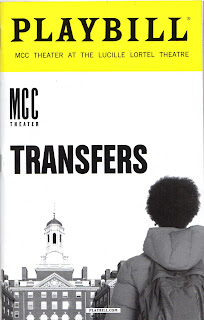“Getting In”
If the theatre is any reflection of real life, competing for
a spot in a top school would appear to be one of life’s most anxiety-producing issues.
That applies whether the goal is a fancy kindergarten class, as in the 2015
comedy Application
Pending, or an Ivy League college, as in this season’s Admissions and
Transfers, a new play by Lucy Thurber
(The Hill Town Plays).
Originally produced by New York Stage and Film and Vassar in the Powerhouse
Season, 2016, it’s now being offered by MCC at the Lucille Lortel Theatre.
Transfers bears a
few similarities to Admissions, such
as its focus not only on a pair of competing students but on the issues of
diversity and the process of student selection. It is, however, far less
successful in making the grade. Overwritten, overwrought, and overacted, it has
an ersatz quality that seems intent mainly on squeezing the material for more
emotional drama than it can bear.
Two young men from a community college, the African American
Clarence Mathews (Ato Blankson-Woods) and the Hispanic Cristofer Rodriguez
(Juan Castano), are vying for one of the four scholarships intended for
underprivileged students seeking admission to a prestigious, ivy-covered, liberal
arts college in western Massachusetts.
 |
| Juan Castano. Photo: Joan Marcus. |
They meet at a motel room where the school is putting them
up prior to their interviews with Geoffrey Dean (Leon Addison Brown), a
literature professor, and Rosie McNulty (Samantha Soule), a women’s rugby coach. (Soule, a good actress, is a little too slender to easily buy as a rugby player ranked number one in her senior year of college.) A fifth party is David DeSantos (Glenn Davis), employed by a private foundation
to prep the boys for their interviews.
The boys appear not to know each other at the community
college they both attend but Cristofer recognizes Clarence as someone from
their old Bronx neighborhood, a recognition Clarence resists acknowledging at
first. Clarence, a literary savant, is gay, polite, quiet, and withdrawn; Cristofer,
good at math, is volatile, hyperkinetic, vulgar, homophobic, and misogynistic. The
boys’ fraught past relationship allows Thurber to open the lid on their shared
experiences in the ‘hood, little of which rings true.
 |
| Ato Blankson-Wood, Leon Addison Brown. Photo: Joan Marcus. |
In five scenes, the play moves from the motel room to Clarence’s interview with Prof. Dean. We
then observe Cristofer’s interview with Coach McNulty; the meeting of the
faculty and DeSantos to decide on the scholarship winners; and the closing
scene at a café where the losing student has a menial job and the winning one visits
him to seek reconciliation.
 |
| Juan Castano, Samantha Soule. Photo: Joan Marcus. |
Thurber’s depiction of the admissions process has to be
taken with a grain of salt. It’s a play, not a documentary, but its
exaggerations—and the rationales driving the discussion—will still niggle
academics who’ve been through it. She creates some volatile moments that crackle
with drama, and the interviews are superficially interesting, especially when
the boys practically interview their interviewers; still, too many parts are melodramatically
artificial. Each character gets to sound off, argue, weep, or pontificate, very
little of it sounding anything more than stagey.
 |
| Glenn Davis, Leon Addison Brown, Samantha Soule. Photo: Joan Marcus. |
In the motel scene, where exposition is crucial and Thurber
needs to have only two of the three characters present, she gets rid of the
third in awkwardly contrived ways. One exits to take a shower, of all things; another leaves to get the food he ordered that never arrived; and the other gets so blazing mad at seemingly innocuous questions that pierce his armor that he flees into the
bitter cold, not even putting on his too-thin jacket.
Costume note: It’s midwinter, snowing, and so cold the
characters gripe about it, yet costumer Jessica Ford provides jackets that
would be too light even for our recently departed chill. One person wears a warm hat and scarf, at least, but gloves seem to
be out of stock in Ford’s costume shop.
Donyale Werle’s attractive set, effectively lit by Russell
Champa, is built so the same solidly realistic-looking room, with outside trees
dangling over its frame, can be quickly converted to other locales by changing
selected elements. Clever as it is, it doesn’t solve the problem of hiding
those illusion-busting, headset-wearing stagehands, the bane of so much curtainless
scene-shifting.
Most of the actors (Soule is an exception) appear to have
been directed by Jackson Gay to give it their award-reaching all; despite the technical expertise displayed, however, this only makes them less believable.
None, though, can compete with young Juan Castano, who is
sure to be lauded highly for his passionate, raging bull-in-a-china shop
portrayal of the defensive Cristofer. Speaking in a studied version of a Bronx
street kid’s accent, he lays on the crude mannerisms so thickly he often resembles
someone on the spectrum: it’s showy but unconvincing.
You may not agree with why one of the students was chosen
over the other; perhaps you’ll even feel sorry for him. I’d agree if this
school was his only choice. But this is a Bronx boy, folks, and the City
University of New York, some parts of which are even ivy-covered, would welcome
him with open arms. And, with his gifts, even scholarships.
OTHER VIEWPOINTS:
Lucille Lortel Theatre
121 Christopher St., NYC
May 13



